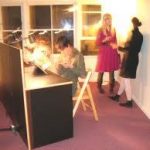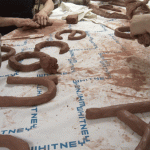The Business of Art: A Conversation with Michael White
Michael White (left) at a jazz funeral for Danny Barker. (Photo: Infrogmation)
Clarinetist, composer, and professor Michael White is a New Orleans jazz ambassador. Early in his career he internalized the lessons of the older generation who faithfully maintained the tradition of New Orleans jazz. Now actively involved with the Michael White Quartet, the Original Liberty Jazz Band, and the Liberty Brass Band, White has recently been working with younger brass bands like the Hot 8 and the Soul Rebels in his native city to pass along the tradition, while simultaneously updating and personalizing that sound in his own composing and performing. Note that White is involved with advancing the legacy of traditional New Orleans jazz, not to be confused with, as he recently wrote in the Journal of American History, “its commercialized, comic, and bland imitation, Dixieland jazz.” White states in this interview with Ron Bechet—a New Orleans-based visual artist, a fellow professor of White’s at Xavier University, and a descendant of legendary clarinetist Sidney Bechet—that jazz should be considered an expression of black resistance, strength, and pride. Like all communities in New Orleans, Katrina dealt the jazz community a significant blow. White lost a vast collection of vintage instruments that he actively used, not to mention original sheet music of musicians such as Jelly Roll Morton. However, White invokes the tradition of the jazz funeral when talking about Katrina, acknowledging the devastating storm’s possibilities for fostering, of all things, rebirth.
Ron Bechet: I’ve been thinking through a couple of ideas… about what jazz represents and means to the city of New Orleans since the storm.
Michael White: I think jazz is one of the ways that defines the essence of New Orleans culture. On the surface it’s traditional entertainment or dance music. Under the surface, it’s very powerful music with a lot of social implications from the time of its origin, certainly as a model and practice of democratic ideals that African Americans were seeking in everyday life. Its freedom of expression and social uplift demonstrated how individuality and collectivism would work at the same time, and this had implications about how society could work to be all-inclusive to individual ideas, tastes, and personalities.
For the city of New Orleans, the music has always been a way of reminding people about the spirit of local people. Creativity here is a unique and special thing. It can be music or visual arts or doing the second line dance in the street. We see creativity in New Orleans in many ways—gumbo. I was telling my students today: the best gumbo isn’t in a restaurant but in people’s houses. Everybody’s momma cooks the best gumbo. Making gumbo in New Orleans is an art that has the same philosophy as jazz; taking a lot of ingredients that don’t normally go together and making them go together.
The first program I presented on campus after Katrina was called The Jazz Funeral.The jazz funeral can be a metaphor for hope, transformation, and recovery. The jazz funeral ceremony is a unique way of looking at death. In New Orleans the idea of death is a transition to a joyous place. The way we celebrate it—with slow and fast jazz music—you both honor a person and lament their passing but recognize the fact that they’re going on to a greater, better place and reward that with joyous up-tempo music and second line dancing. I think that teaches us to make the transition from New Orleans as it was before into another, post-Katrina existence. Things will never be the same here, so whatever this is going to become, we need to make that transition. I looked at jazz and realized there’s a lot of survival philosophy in the performance of the music and the interpretation of melodies. There’s optimism, strength, hope, unity. On a personal level, that’s helped me a lot. A lot of communities are down and people are suffering but we still have that spirit. Jazz music symbolizes that spirit.
RB: And how is that coming out in the new pieces you’ve been writing?
MW: In a lot of cases, they developed over time. There are 42 new songs; at least 30 are close to finished. It’s like discovering a gold mine and mining it. I’m amazed to know that all of that came out of me.
RB: They’re so diverse. This one cracks me up—“Bambula Hula.” (Laughter)
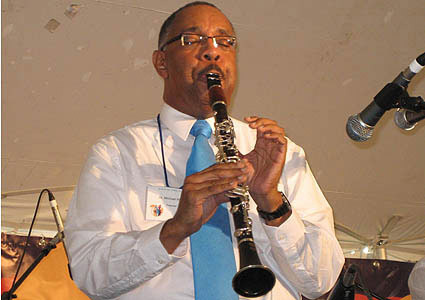
Michael White
at the Smithsonian Folklife Festival
Washington DC
(Photo: Danielle Trusso)
MW: I changed the names of some of those songs. I changed that one to… no I didn’t change that one! I wrote it and put it down. It was good, but not as good as some of the songs that were in a New Orleans/Caribbean vein. I had two others I felt were a little better, so I went back to work on those.
RB: Some are looking back, like “New Dodds Idea.”
MW: Johnny Dodds was a famous New Orleans clarinet player who played with King Oliver in the 1920s. He was one of the best and most influential. Sometimes I would get an idea about a musician and a style they played and I try to do something that sounds like it could have been something they did but not something they ever did. So with the Dodds stuff I tried to mix traditional New Orleans music with other ethnic music. I was experimenting in terms of structures but also adding Caribbean elements. I ended up with three Dodds ideas. The best one evolved into what I eventually called “London Canal Breakdown.” The term breakdown, in jazz circles, usually refers to a kind of dance. Jelly Roll Morton had a song called “London Blues,” which was originally called “London Café Blues.”
RB: The first thing that occurred to me was where your house here in the city was.
MW: That’s what I thought about. I’m definitely not trying to do a Katrina album. By the same token, that’s the defining moment in the history of the city, probably the most important one since its founding. So you can’t avoid it. Jazz deals with the reality of life. There are a lot of different realities—the experiences of Katrina, the experiences of post-Katrina, people dealing with faith, people dealing with escapism. You can hear in the titles, which reflect my concept of the mood. Duke Ellington always said he was trying to tell the story of his people, the Negro people of New York. I was trying to tell the story of people and life in New Orleans today, based on my own experiences. So the song titled “Katrina” is not a joyous piece, but an emotional, reflective piece. I have a hymn called “He Leads Me On This Journey,” which is about faith. The post-Katrina experience for me has been a journey with different stages. Faith has helped.
RB: For the black community, there’s a saying. My mom always said, “You go as far as faith will take you.”What are some examples of how the city itself influences your music? For me it’s an amazing experience to go out there every time. You get caught up in the whole experience.
MW: I always write about people. Katrina made a lot of us in different art forms recognize the uniqueness of what we had and what we lost. It’s given us a sense of appreciating. I had tremendous losses in Katrina but I realized that I didn’t lose the most valuable thing I had: music, heritage, tradition, and the experiences and memories of older musicians. I was very fortunate to have several years of contact with more than three dozen musicians who were born between the late 1890s and 1910. They taught me so much about life and music. All of them are gone now, but their spirit is still alive, still inside of me. It’s alive in memories, and it’s also alive in the music I play. I try to combine what they gave me with personal experiences and emotions to contribute to a new interpretation of a tradition.
RB: And I think you can pass that on, to groups like the Hot 8 and the Soul Rebels.
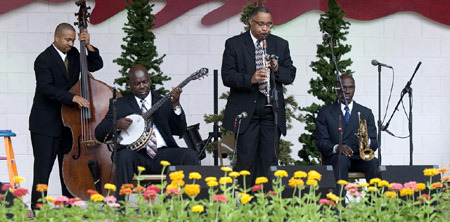
Michael White Quartet (2006)
Glenwood Springs, CO
MW: Oh yeah. We’re working on different ways of doing that. One of the things I want to show people—especially in America—is that traditional jazz music is not a series of simple songs, like “When the Saints Go Marching In.” It can be fun, but it’s a powerful spiritual music that has serious meaning. That New Orleans jazz language can still be fresh and creative and alive—and express contemporary life through the language of tradition. I have some ideas for the Hot 8 Brass Band… they don’t know some of them yet. (Laughter) One of the things I’d like to get them to do is to play marches. One of the staples of brass bands around the world is marches. Young brass bands don’t play marches; they have a lot of different parts and can be complicated. Marches in the contemporary style could be interesting. I’m maybe even working on a couple of marches for them.
I wanted to ask you something. One thing I’ve noticed post-Katrina is that music people are writing sort of nostalgic autobiographies. There’s a lot of emphasis on autobiography—people who lived and experienced NO culture. Has there been the same kind of tendency on the part of artists, photographers, writers?
RB: Not necessarily in the format of a book, but in programs and associations that wouldn’t have been made before the storm. Groups are meeting that wouldn’t have gotten together before the storm. What comes from that? We’ll have to see, but I’m interested to see that there are people coming together to do things that are programmatic. We did a course at Xavier called “Whole New Orleans.” The course itself involves Xavier students, Tulane students, and Dillard students. It’s called “Building Community Through the Arts.” They work in teams and with neighborhood programs and projects. We would never have been able to do that before Katrina. There seems to be an interest in figuring out how to pass on through culture and how to deal with people in a humane way through culture. We’re trying to teach how to build a human society using the arts.
MW: One interesting thing that’s happened post-Katrina is that some of the younger guys in brass bands and older guys like myself started to recognize the importance of tradition. About a year and a half ago I started to work with the Hot 8. We did a series of workshops and clinics and they wanted to know more about the tradition of the music. Since then, we’ve done a number of concerts together and we still get together and talk. That’s been a good thing.
Brass band music makes you feel like you’re part of an extended family. There’s a feeling of community that kind of erases a lot of things; it makes you forget your economic status or what’s going on in the world around you. That sustains you, it gives you something else to focus on. It’s taking you psychologically to another existence.
RB: And you have a special place within a community that’s yours. In the visual arts community, younger artists and more established artists have gotten together more now than ever before.
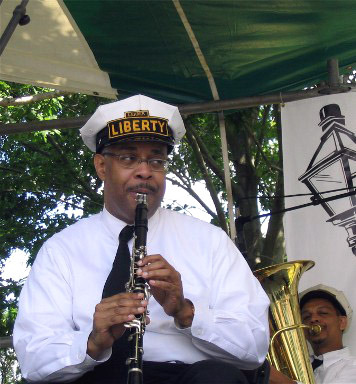
Michael White
with the Original Liberty Jazz Band
MW: One of the interesting aspects of that is how many people were displaced. It made you realize how special we were when everyone was in Houston or Atlanta or Baton Rouge. It made you realize that nothing was happening here! No gumbo culture, no sense of communal understanding. When you’re in New Orleans it’s almost like you understand each other from a cultural-historical point of view and what you have in common can be expressed through music and dance and food. You just don’t get that fraternal sense in other places.
RB: Where people say “Good evening” and know your name. You don’t really have that in other parts of the country.
MW: Jazz was a great equalizer for a lot of people in the early days. I always talk about the story of a guy who cut hedges on Prytania Street; just another black man. What he thought didn’t matter, what was in his mind didn’t matter, his opinions didn’t matter, his intelligence didn’t matter. But at night he played the coronet. And he played it so well that he became known as “King”—that was King Oliver. In a symbolic and real way, jazz removed him from the level of invisibility and linked him with the status of royalty.
In today’s second line parades, poor people can become rich people. They spend hundreds, sometimes thousands of dollars on that outfit they’re going to wear. It’s very important. And they feel respected. Music is a great equalizer; you can be poor, with any appearance or size, but you can be respected and accepted. I’ve seen dozens and dozens of musicians who might normally be ignored in society be cheered by anonymous people. Jazz creates a common spirit, and that sense of brotherhood erased the sense of loneliness in African American culture… which you see sometimes in blues culture.
RB: My former studiomate, the artist John Scott, said that the second lines are an example of tremendous unity and diversity; all these people moving to the same beat but doing their own thing within that structure.
MW: That’s what the music does! Everyone’s playing the same key, but doing it their own way. Jazz teaches you how to become an individual and have your individuality accepted and praised.
RB: There’s a group of young men who would do “buck jumping in New Orleans;” it reminded me so much of some of the culture in Mali. These guys would jump up in the air, reaching for the sky, and come down right in time with the music.
MW: African heritage is so strong and alive, even in this transformed state. It has become a way of challenging and redefining concepts of reality—it’s existential, in a way. Jazz music challenges meaning and interpretation through improvisation. A lot of dancing also challenges traditional concepts of existence. People do things that defy social order… even death. One example is these guys who dance on the narrow rails of the interstate: jumping and hopping all in time to the music. It looks like they’re about to fall, and it’s like they’re challenging death, almost making fun of it. It’s the same thing you see with guys dancing on rooftops—shingles falling off and they’re dancing in time to the music. And they never fall off. I write about that stuff. I see the symbolism in that. All of those to me are blatant examples of the extension of democracy. Of totalfreedom. Freedom to redefine existence: this is not a house, not a car, this is a dance party. I may not own it, but I show victory over it because I conquered it.
Michael White will play at the New Orleans Contemporary Arts Center on February 22.


